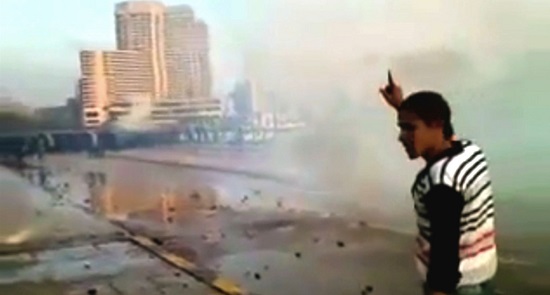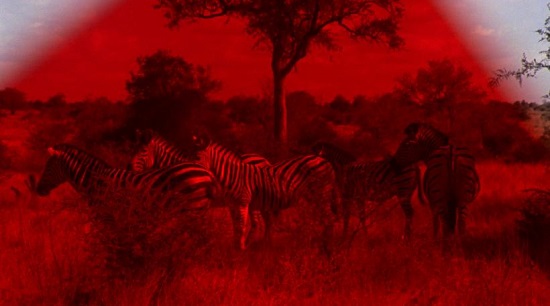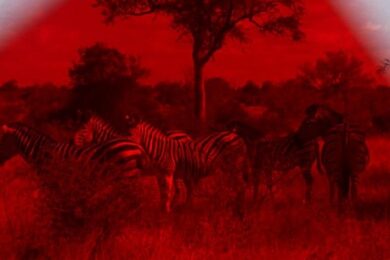It was a week of mixed emotions for Berwick-upon-Tweed. The formerly Scottish town has been at the centre of many a border skirmish between England and its northern neighbours over the centuries, and to mark the referendum on Scottish independence, the town’s chief annual cultural event, Berwick Film & Media Arts Festival (BFMAF), took as its theme this year ‘Border Crossing’. Just as the festival was entering the midpoint of its customary five-day stretch – a juncture enabling ruminations on both the past and the future – news came rumbling through that Scotland’s No voters had outnumbered its Yes voters. The referendum had finally been decided.
Later that day, as evening fell and a BBC news crew stationed itself outside the town hall hoping to interview locals about the outcome, the lights dimmed inside Berwick’s warmly-lit and appreciably stuffy Maltings Theatre & Cinema. Attendees gathered for a sumptuous audiovisual showcase from Addictive TV, the veteran VJs whose latest work, Orchestra Of Samples, boasts an international array of musicians – coverage of whom is chopped, looped, juxtaposed and interspersed to foot-tappingly maximum effect. Orchestra of Samples brings together musicians from Europe, Asia, Africa and South America. The notion of borders couldn’t have mattered less: as Addictive TV’s Graham Daniels suggested at the onset, the last thing we need in the world is yet more boundaries – be they regional, national or otherwise.
Samples celebrates cultural commonalities in all their polysyllabic richness: otherwise wildly disparate sources interact with and complement one another in enthrallingly unexpected ways. Here a violinist, there a drummer; there a flautist, here a singer. An artwork so invested in such distinct cultural identities was a particularly canny programming choice. BFMAF itself celebrated its tenth edition this year, and looked back with the ‘Border Crossing’ theme to its inaugural programme in 2005, which under the thematic umbrella of ‘Crossing Borders’ looked to challenge the increasingly blurry boundaries between art installation and cinematic exhibition. Since then, the festival has gone from strength to strength. Making full use of Berwick’s historic locations – from prison cells to ice houses to military barracks – BFMAF has, through consistent, careful curation, earned its reputation as a dependably engaged beacon among themed events of its kind.
Much of that has been down to Melanie Iredale’s five-year tenure as Artistic Director; another occasion for looking backwards and forwards throughout this edition was that in the days prior to its commencement, Iredale announced she was leaving for a deputy director role at Sheffield Doc/Fest. That’s a fitting destination for a curator whose farewell BFMAF programme leaned clearly if not wholly toward non-fiction. While Swiss-born Barbara Miller’s Forbidden Voices is an unambiguously documentarian account of three women in Cuba, China and Iran braving the hostile climate of web activism, Jung and Laurent Boileau’s Approved For Adoption and Peter Snowdon’s The Uprising respectively fictionalise and repurpose actual events – as partly-animated autobiography for the former and as a collage of real Arab Spring footage taken from YouTube for the latter.
These films chimed with one another in obvious ways: each is rooted in a quest for truth, for a greater understanding of cultural and historical events, and for something resembling a fairer world. No theme was more prevalent, however, than the dissolution of borders as we traditionally think of them: the heroines of Miller’s film are taking to online forms of protest in order to draw attention again and again to the suppressive parameters actively and often brutally upheld by their respective governments, while for Jung, on whose graphic novel Approved For Adoption is based, identity has little to do with nationhood or belonging. In Snowdon’s film, recent events in Tunisia, Egypt, Bahrain, Libya, Syria and Yemen are decontextualised and juxtaposed to suggest that another revolution based even more on common needs and togetherness may be possible – the home footage of an Alabama tornado that bookends the film seemed as celebratory as it did ominous.

Each year, BFMAF commissions pieces from artists and filmmakers to respond to its given theme with site-specific works that draw attendees – locals and international visitors alike – into spaces that might otherwise fall further into disuse. Chief among these this year was Ben Russell’s The Twilight State, a looped half-hour film set between Swaziland and South Africa that delivers one indelibly colourful image after another. Catalogue synopses refer to beginnings and therefore imply a narrative structure, but on the two occasions I saw it – in a starkly cold, old dark icehouse – there was something persistently elusive about the film’s cyclical nature. The prayer rituals, healing rituals and other customs local to the regions dreamily depicted therein begin to take on an eerily aggressive, weirdly transcendental edge – and all the while a suggestive, ceaseless drone permeates the air.
Rituals more local to Berwick were the subject of Katie Davies’ The Lawes Of The Marches, a newly commissioned piece that probes the political ramifications – both seen and unseen – of the Common Ridings, a tradition of communal horse-riding that dates back to the 13th century, and which takes place each year along the English-Scottish border. Employing three screens to effective, panoramic use, Davies is at her best here when placing her camera before an unthinkably beautiful border landscape, capturing a merry band of men hurtling across it on horseback. Often zoomed in to its subjects, the camera doesn’t allow for easy comprehension of the ceremonies: indeed, amidst all the palpably patriarchal tradition, one is left wondering just how and why the eponymous ‘Lawes of the Marches’ were formed to begin with – though it gives a vivid sense of community and togetherness even so.
Perhaps the most unlikely source of enjoyment this year, though, came from its ostensibly driest. Tweed-Sark Cinema, an eight-screen installation by John Wallace and Pete Smith, dares to document the complex ecosystems surrounding the two eponymous rivers that mark the English-Scottish border. Working with Smith – Professor of Soils and Global Change at Aberdeen University – Wallace captures both rivers at times not dissimilarly to Peter Greenaway’s 1975 short film, Water Wrackets. Any abstract qualities are balanced, however, by a wonderful accumulation of insights about the women and men who live, work and play along these rivers. Succeeding BFMAF 2013’s commission, Kelly Richardson’s broodingly bassy installation The Last Frontier, Tweed-Sark Cinema filled Berwick’s Bankhill Ice House with airs at once anecdotal and concrete – and, pound for pound, there was no image in the festival that could quite match its delectable depiction of honey being processed and machine-poured into an endless, river-like line of empty jars.



